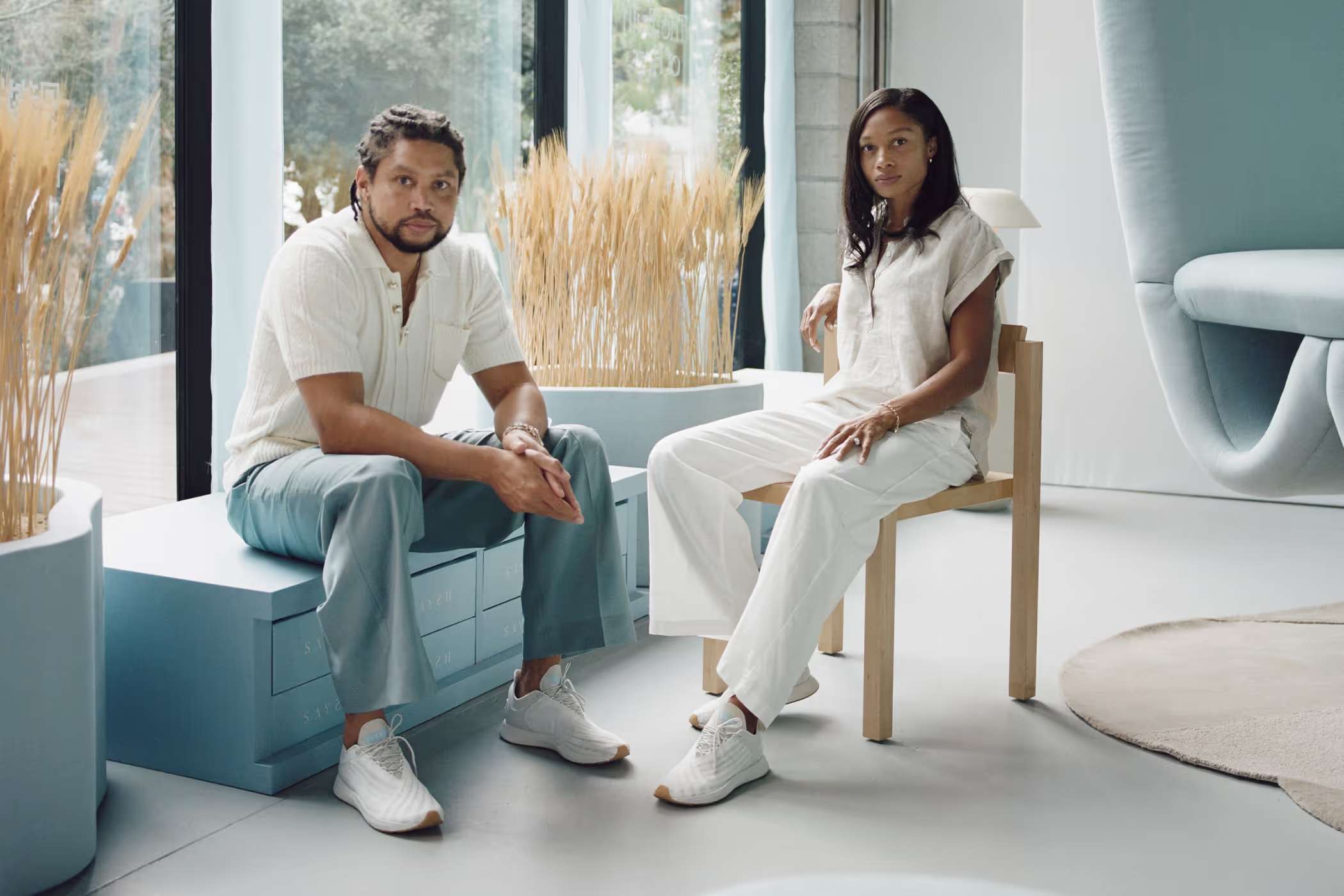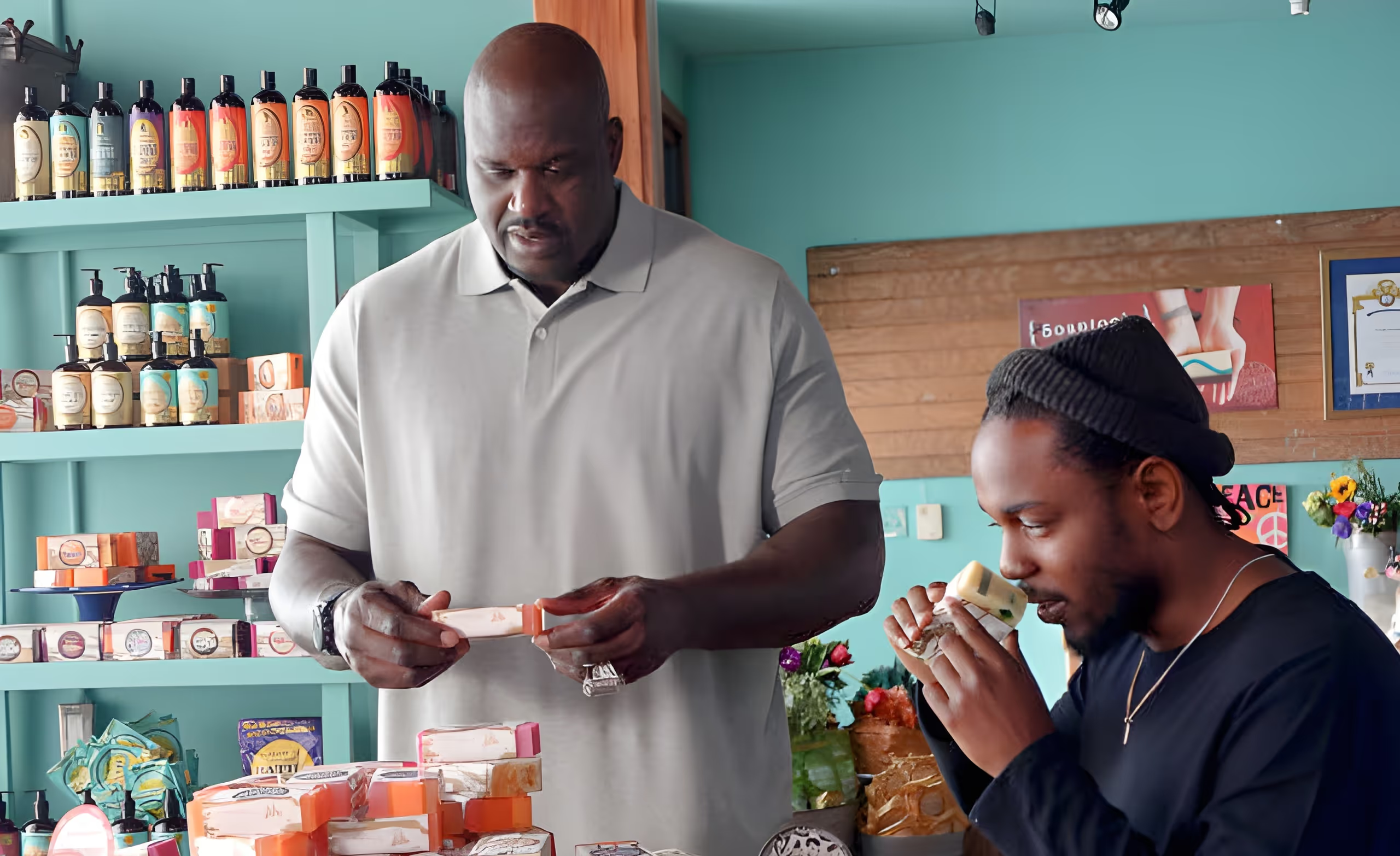
Articles
Allyson & Wes Felix are Using Their Company to Push Change for Women
October 6, 2022

We wanted to start off Playbook 2022 with a bang, and we knew just the pair of siblings to help us hit the ground running.
Allyson and Wes Felix are the co-founders of Saysh, a community-centered shoe and lifestyle brand. Older brother Wes, who serves as Saysh CEO, was an All-American track athlete before he transitioned to sports management. His agency EVOLVE represents a number of track and field stars — including his sister Allyson (a name you might recognize from a small summer sports competition in Tokyo last year — ahem).
Allyson Felix, Saysh president, is an Olympic gold medalist and the most decorated American track athlete of all time. She has been featured in Time Magazine as one of their 100 most influential people of 2021. Allyson also made headlines in 2019 following her op-ed in the New York Times highlighting the struggle female athletes face with sponsorships and the sports apparel industry when it comes to pregnancy and maternity.
Allyson and Wes started their company for a simple reason: Allyson needed shoes to run in at the Tokyo Olympics. But over the course of their time in the business, they have taken on a greater purpose and a new goal — to promote change for women, on and off the track. And in doing so, Saysh is changing the landscape of women’s footwear and building community along the way.
So, how did they do it? We were lucky enough to bring them to Playbook 2022 so they could talk about their transition to business, building Saysh from the ground up, and finding ways to change the women’s footwear industry forever.
🔥 Tip: Want to catch all the Playbook 2022 replays? Register here and get them sent straight to your inbox!
A little herstory
Pre-Saysh and pre-Olympics, Allyson Felix needed shoes.
Back in 2019, Allyson wrote her NYT op-ed because of issues she had with then-sponsor Nike. Allyson, who was pregnant at the time, was negotiating a new contract with the sports brand after working with them for almost a decade. But the company wanted her to take a 70% pay cut and failed to support the maternity protections she requested.
Sadly, this is a pretty common issue with all female athletes.
“The culture regarding women and pregnancy in track and field as a whole was like a culture of silence,” Allyson explained. “Women would either hide pregnancies to secure new contracts or contracts would be paused.”
And while Nike did eventually update its maternity policy for sponsored athletes following the outspokenness of Allyson and other female runners, Allyson ended up parting ways with them. But then, a new problem arose: finding a shoe sponsor before the Tokyo Olympics.
Allyson, tired of asking companies to see her value, went to her brother Wes. His suggestion? “Why don’t we do it ourselves?”
And thus, Saysh was born. (For those wondering — yes, Allyson did race at the Olympics in her company’s shoes. And won gold for her troubles.)
“Here’s an opportunity where we create the change and not wait for others to do it for us.”
<blockquoteauthor>Allyson Felix, co-founder and president of Saysh<blockquoteauthor>
Bringing experience to a new starting block
Neither Wes nor Allyson knew anything about making shoes when they decided to start a shoe company. “In those beginning stages, we just had that same feeling of being overwhelmed,” Allyson shared.
Wes added, “If we knew what it was going to take when we started, we would have never got started. So I’m so glad we didn’t know what it was gonna take.”
Because designing and selling shoes isn’t a simple step-by-step process. Not only is there a lot of specialization involved, but in Wes’ words, “when you broke it down to this ten item checklist, each one of those steps had a 100 more items underneath it.”
Luckily, as championship competitors, they knew a thing or two about overcoming tiny hurdles like that. That’s when Wes pulled in his experience from starting his sports management career.
“The first thing I did was say, ‘There’s a lot I don’t know,’” said Wes, when asked about starting as a sports agent. “‘Who can I go to that might help me?’”
.gif)
The power of coaching.
Wes decided to contact Jill Smoller — AKA, the agent of tennis superstar, Serena Williams.
He cold-called her office for almost two months, failing to get through every time. He was finally able to reach Jill directly on Facebook (2010 really was a different era), and what followed were years of mentorship (and eventually partnership) in sports management.
Even as an experienced agent to one of the most highly sought after athletes in the world, Jill let Wes ask questions and provided access to information that he didn’t even realize he was missing. “What Jill really brought was an understanding of what a deal should be,” Wes said.
He recalled bringing Jill into his initial sponsorship meetings and noting how different companies would react when Wes and Jill were together, because the experienced agent knew the actual value of their worth.
“A deal that might have been ten cents, Jill told me should have been a dollar.”
<blockquoteauthor>Wes Felix, co-founder and CEO of Saysh<blockquoteauthor>
Wes’ relationship with Jill really set the tone for his career in sports management. He recognized that when he didn’t know something, he needed to find someone he could learn from. And given how well his previous experience turned out, Wes brought that same idea to Saysh. Since the Felix siblings didn’t know anything about creating a shoe, they’d bring on designers and manufacturers who did. Together, they launched a product that not only propelled Allyson over the finish line in Tokyo, but are now sold the world over.
And it was also one of those designers who helped change the course of Saysh forever.
Running toward a different finish line
When talking about the beginning of Saysh, Wes said, “We thought the problem was that Allyson didn’t have shoes to run in at the Olympics.”
Enter Tiffany Beers, a former Nike footwear designer who joined Saysh and helped them develop their first product. One day, she was talking to Wes when she dropped the bombshell question that would alter Saysh’s mission forever: “You know shoes aren’t made for women?”
Turns out, all shoes are designed based off lasts (mechanical forms shaped like a human foot). The problem: lasts are based off of men’s feet, including the ones used to design “women’s” footwear.
.gif)
When he heard that, Wes only became more confused. “So what’s the women’s wall then?” he asked. When Tiffany answered, “marketing,” his reply was, “That’s not marketing, that’s lying.”
The more research they did, the more they realized the truth behind Tiffany’s statement — no sport footwear companies were creating shoes designed off lasts based on women’s feet. “The real problem was women were being overlooked by the brands they’re most loyal to,” Wes said.
And so, they moved to solve the real problem. Instead of just selling the shoes that Allyson Felix wore at the Olympics, Saysh became an actual women’s footwear brand, selling shoes made by women for women’s feet.
Saysh’s maternity returns policy.
As part of their commitment to providing for their customers and women who had been continuously overlooked by the footwear industry, Allyson and Wes started the maternity returns policy based on Allyson’s own experience during her pregnancy.
“A lot of people don’t even know this — a woman’s foot can change size when she becomes pregnant, and a lot of times, that change in size is permanent,” Allyson explained. “I found that out when I became a mother, and I was like, ‘wait — my foot is not going to go back to its original size?’”
So, as another way to support women and balance out some of the inequality women face, Saysh will replace expectant mothers’ shoes.
“We also want to push the industry and [prove] this is the way we can show up,” Allyson said.
Sharing a podium with the competition
As competitive as Wes and Allyson are, they aren’t looking to make Saysh the runaway winners of the women’s footwear industry. “We got really excited when Lululemon decided to enter the market with shoes the same way we built shoes, based specifically on women’s feet,” Wes explained.
They don’t want Saysh to be the only company making shoes based on women’s feet — that’s not a sign of true change.
“We want to create change more than anything,” Wes said. “Seeing a player like Lululemon enter the space and say, ‘we’re selling shoes based on women.’ They’re not a competitor — we support that, we celebrate that. If our company ceased to exist because Nike or Adidas decided to create shoes for women, that is success.”
.gif)
Which isn’t to say that Wes and Allyson aren’t committed to building Saysh into a successful and wide-reaching brand. The company is “community-centered,” and the Felixes are focused on building belonging.
About a month ago, Allyson was getting on a plane when she saw a woman wearing Saysh shoes. “She really connected with the mission, where it resonated with her. I want to see more of that in the world, more of those stories. In four years, I hope I’m looking out and seeing those shoes, hearing those stories, and feeling the power of the collective,” said Allyson.
Taking lessons from the track to the board room
Wes and Allyson both started their professional careers as hardworking and hugely successful athletes. We asked them for their top lessons on both running life on the track and running their business from the board room:
- “You can have a bad start but still recover.”
- “Be focused on the goal in front of you.”
- “Stay in your lane.”
- “Don’t be constantly looking around at your competitors.”
- “Lean into the idea of team. There are so many people who pour into you, who are experts in their area that allow you to get up on that podium.”
- “At the end of the day, whether you win or lose, you’ll be just fine.”
Allyson and Wes Felix started Saysh to race in the Olympics. But what they’ve developed since then is a company that’s breaking the glass ceiling of the women’s footwear industry. And while it may not be the mission they started with, both siblings agree that inspiring change is the mission that their customers flock to.
Even before Saysh existed, Allyson and Wes understood that their actions could be the catalyst for change in policies and modernized standards that help women everywhere — not just athletics. And given all the change they’ve already accomplished with women’s footwear, it’s surprising to think how the NYT op-ed that launched this entire movement almost didn’t happen.
When Allyson struggled with the decision to come out against Nike and risk her position in track and field back in 2019, she went to her big brother for advice. His words back then still encapsulate the mission behind Saysh now: “You can use your voice, even if it shakes.”
Similar Blog Posts










